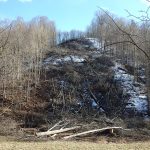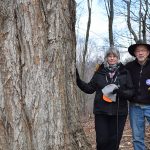People in the Path of Pipelines
New pipelines transporting natural gas and gas liquids would cut across hundreds of miles through Appalachia and beyond, putting people, land and water at risk. Here, residents along the route share their stories.
Cletus and Beverly Bohon
Cletus and Beverly Bohon value their wooded acreage at the end of the road in Montgomery County, Va., for its privacy. But the Mountain Valley Pipeline is widening their road, burying a creek and cutting a swath through their trees.
M. Beram
M. Beram’s formerly quiet neck of the woods in Doddridge County, W.Va., is already impacted by the fracking industry. Now, the Mountaineer XPress Pipeline’s right-of-way is running several hundred feet from her home.
Ashby Berkley
Ashby Berkley’s plans to renovate Sweet Springs Resort in Monroe County, W.Va., are muddied by fears of the Mountain Valley Pipeline puncturing an aquifer and depleting the resort’s renowned natural springs.
Barbara Exum
Barbara Exum of Wilson County, N.C., says “there is a presumption that African-Americans do not care about the environment.” But she has been fighting against the Atlantic Coast Pipeline in her county since the beginning.
Elise and Ellen Gerhart
Fighting back against a pipeline company with the worst oil spill rate in the country, the Gerhart family of Huntingdon County, Pa., started a tree-sit in March 2017 that was still ongoing a year later.
Robie Goins
Robie Goins of Robeson County, N.C., does not own land directly in the path of the Atlantic Coast Pipeline, but he is gravely concerned about the effects it would have on his Lumbee community.
Barbara Jividen
If the Mountaineer XPress Pipeline is built, Barbara Jividen’s “little piece of paradise” by the Kanawha River in Putnam County, W.Va., could be upended.
Bill and Lynn Limpert
When Bill and Lynn Limpert retired on 120 acres of rugged Virginia mountains in Bath County, Va., they never thought they would have to fight against Atlantic Coast Pipeline developers seeking to cut down their old-growth trees.
Carolyn Reilly
The Reillys moved to Franklin County, Va., in 2010 in search of a more fulfilling, farm-based lifestyle — a lifestyle disrupted in the past few years by the developers of the Mountain Valley Pipeline.
Ella Rose
Ella Rose enjoys watching wildlife near her home in the Buckingham County, Va., countryside. But Dominion Energy’s plan for a natural gas compressor station roughly 500 feet from her home in Buckingham County has disrupted that.
Marvin Winstead
Marvin Winstead’s farm in Nash County, N.C., has been in his family for generations — and he refuses to allow the Atlantic Coast Pipeline to touch it.
Related Articles
Latest News
More Stories

Leave a comment
Your email address will not be published. Required fields are marked *
2 responses to “People in the Path of Pipelines”
-
Hi Mzunga,
Thank you for your comment. I’d like to offer a few thoughts, the first being that no one at Appalachian Voices and none of the landowners interviewed here is suggesting that pipeline opponents should damage gas infrastructure, as the comment implies. These pipelines are too dangerous on their own. As you may know, just last month, the new, “best-in-class” LeachXpress Pipeline exploded, incinerating 10 acres in West Virginia. Thankfully, there were no homes nearby, and no one was injured. But unfortunately there are many homes, businesses and schools within the blast zones of these pipelines.
To your comment about the environmental impacts, citizens are concerned about the risk to waters that come from erosion and sediment during construction and the chemicals that sediment can drag with it. Appalachian Voices recently submitted comments to the State Water Control Board in Virginia, which you can read about here: https://appvoices.org/2018/06/28/va-regulators-urged-to-reject-blanket-permit.
Yes, methane escaping from a leaky pipe would not mix with the water, but it poses an explosion risk if trapped in karst terrain, and if it escapes to the atmosphere it exacerbates climate change. Of course, leaks can also lead to explosions.
In the case of the Mrs. Simmons you mentioned, we certainly agree that access to affordable energy and improved home energy efficiency is important. It’s unlikely that she would benefit from these new pipelines, however. Most of the gas that would travel through the Mountain Valley and Atlantic Coast pipelines is not destined for residential heating use (aside from a small portion of MVP capacity being purchased by Roanoke Gas). The vast majority of this gas is destined for power plants and for export overseas.
It seems that Mrs. Simmons would be well-served by programs that provide energy efficiency upgrades to low-income residents. While some programs like this already exist, our team is calling on electric cooperatives and other utilities to increase access to these cost-saving programs.
-
Most of the people against this pipeline are young and inexperienced. They need perspective. The rest just need facts and not funny bone reflexes.
The key word is GAS. Natural gas is lighter than air and would float up not into waterways. If you accidentally scratch your arm it heals doesn’t it? This pipeline trail will heal and the next generation of children will not even know the pipe is there. You don’t trust mother earth? It will be covered in meadow grasses, flowers and plants indigenous to the area. Bird droppings will plant seeds of blue berries, sumac and black berries to the area. Back home in Arkansas my dad and I used to pick buckets of blackberries along the pipeline cut and the Weyerhaeuser clear-cut land until it all healed and I grew up and moved away.
I have personally asked Skrat to plant acorns and pine cones for you. It is going to be fine.
But somewhere Mrs. Simmons lives and she is widowed. She lives off of disability income and her deceased husband’s social security check. Last winter was the worst winter in many years; a solid month where the nights dipped into the teens and twenties. The heat pump she has was broken and she didn’t know it so her electrical bill was $650 for just February. Thankfully the power company extended a payment plan and her Methodist church helped her make payments. Gas heat would bring her heating bill down to about $95/ month from the average $210/mo and her grown children think they can pool their money and upgrade her central air system to gas.
We Republicans care more about the Mrs. Simmonses of the world and less about the birds and bees and we think you should too. God bless!
Oh, I need to add one word of caution to ya’ll. When this thing goes into production and you decide you are going to destroy it Lord have mercy there would be a fire ball so big where you were there would not be enough DNA to figure out who the body was. Those of you on my side if you see something say something.
















Leave a Comment